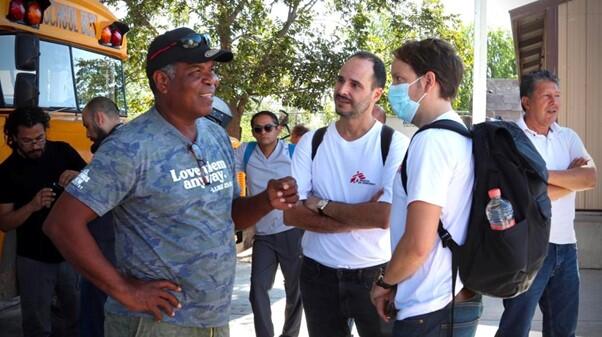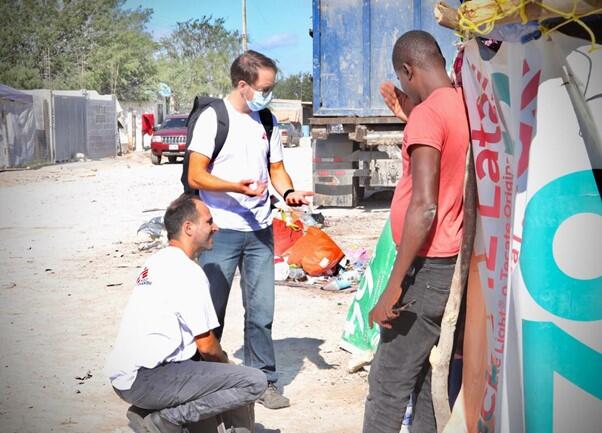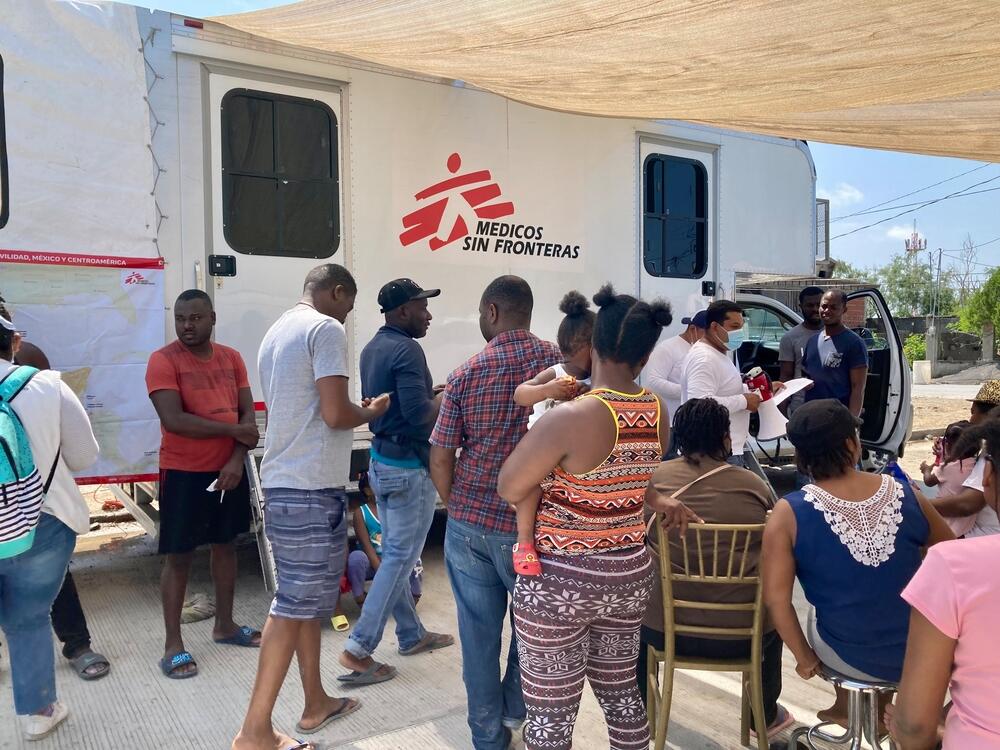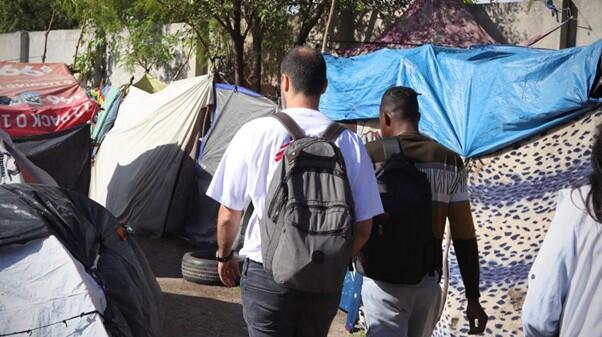Christos Christou: “We're very concerned about migrant’s situation in Mexico, but the government won’t answer”
17 November 2022
The president of Doctors Without Borders (MSF) visits Mexico and said to be “very concerned” about the situation of migrants who are stuck in the country after changes in immigration policy by Joe Biden’s administration.
By. Daniel Alonso Viña, México 15 Nov 2022
How’s everything?
Well, wrong -says Geaninna Ramos, worker for Doctors without borders (MSF) México, while smoking a cigarette at the entrance to the organization's offices and takes the opportunity to rest a bit. Every morning she goes out into the streets and tends to the hundreds of Venezuelans who are coming to Mexico City.
According to data from the organization, there are 41,000 migrants of this nationality trapped in the country. Ramos is one of those in charge of speaking with the hundreds of men and women who arrive to the capital, and do not know how or when they will be able to continue their way.
In the last few weeks, they have not been able to find them a place to sleep. “We see entire families sleeping in the street”, say Ramos, “but the shelters are full, and we can't find places for them”. The shelters of the city belong to civil society organizations and, with the little support they receive from the authorities of the capital and the state, they don’t have enough to make meets end.
In the middle of her break, Geaninna attends the reporter, opens the double doors of the MSF office in Mexico City, and introduces him to Christos Christou, the international president of the organization, who conceded an interview to EL PAÍS to talk about the migratory emergency created after the new policy of the US and Mexican governments. He is a doctor and surgeon, he began his career at MSF in 2002, working with immigrants and refugees in Greece. Then he went to Zambia, where he worked on a project to treat HIV in the region. He has also been on missions in South Sudan, Iraq, and Cameroon.
Why did you come to Mexico now?
Because me and my colleagues from MSF are very concerned about the migration situation in the region. The numbers are not normal, they are too high, and they are accumulating in all points along the route, creating situations that we consider to be emergencies. Humanitarian organizations are doing all that they can, but its not enough.
More and more people need help, but organizations don't get help from anywhere, nor more resources, nor more money to do their work. And the response of the authorities is being completely insufficient.
Have you been able to talk to the Mexican government?
Yes, I met with Alejandro Encinas Rodríguez [Undersecretary of the Interior for Human Rights, Population and Migration] and with Maximiliano Reyes Zúñiga [Undersecretary of Foreign Affairs for Latin America and the Caribbean]. To them I expressed my anxiety about the situation here. I told them they must do more at the federal level and coordinate better. I also wanted to make sure that they see the emergency as we see it.
And what did the authorities say?
Well, some seemed more concerned than others. They all listened to me, but they don't seem to feel pressure, they don't seem to feel how the current situation is deviating from the normality of recent years. But, now, we think about how things are going terribly wrong.
You were in Reynosa, on the US border, what did you see there?
There and throughout Mexico, migrants are very confused, they don't understand what can they do, where can they go, or even what the process is. They wonder: Why does he have priority and I don't? What are we waiting for? People spend their days not knowing what's going on and that's the perfect recipe. The frustration accumulates and then thing can get out of control very easily. In Reynosa we saw entire families detained, even though they had all the necessary paperwork to be in Mexico legally. When you see minors detained, you start to worry, when you see kids sleeping on the street, without water or access to any basic need, you worry. There isn’t enough answer from authorities, and we need them to be the leaders of this effort to care for this people.
Data from last couple of years state, at least in the short run, that the new strategy is functioning. There are less migrants on the border.
It depends what it means to “function”. If it means that it’s satisfying the public opinion of sceptics and conservatives in the US, yes, its functioning. You see less people crossing the border, make their lives hell, but its functioning, the numbers add up. But, what does it mean to function? It means that its also functioning the tactic of simmering even further the people who are desperate to find a better future. I still remember when I was in Greece, working in the migrant crisis that was developing a couple of years ago, and I remember vividly of everything they used to do to discourage people from making this journey, all of this, at the end, doesn’t work, people are desperate and choose even more dangerous routes that may lead to their deaths.
Your next stop is in Washington. What will you do over there?
I'm going to meet with Biden´s administration officials. I want to know what to expect in the close future, and I want to express my concern of what’s going on. I want to talk to them about policies that may seem useful, that might work, but come at a terrible human cost.
The border between US and Mexico is not the only one closing. We just saw what happened to ships from your organization in the Mediterranean. They had over 1000 migrants on board and not one European country wanted to tend to them. Or the deaths in valla de Melilla, which presumably happened in Spanish territory. Not to mention climate change and it´s effect in the increase of mass migrations. Where are we headed?
It's no question that climate change is the biggest challenge. We can't imagine how big this problem is going to be for humanity, even more so than the pandemic we just had. In Doctors Without Borders we’ve seen its effect in the regions in which we work in. It’s specially serious that the least responsible for what’s going on with the climate are the most affected. Recently, I’ve been to South Sudan, Somalia, Chad, and seeing what’s happening over there, you understand that contamination may be created at one site, but it affects all of the planer, creating numerous crisis at a place already under very serious burdens. Climate change makes them move, maybe inside the same country or to others, that’s a fact, and just one of the consequences. At the same time, we see that more developed countries are increasingly less kind to migrants.
Even from governments that declare themselves leftists or progressives, like the United States, Spain or even here, in Mexico.
Yes, yes, it seems that what dominates the agenda and narrative is security and not more so humanity. Besides, the notion between right and left, at least in this topic is much more diluted from what it used to be. There are more progressive governments that can’t adopt progressive policies, because apparently there is a political cost they aren’t willing to assume. We’ve denounced this and in consequence we don’t accept any money from the European Union, for example, because we’re against of what they do through Frontex.
Why is all of this happening?
Because people are more worried about protecting their little garden and prevent an alleged invasion. Those of us who want to help these people have more problems every day, we call it “the criminalization of humanitarian aid”. They accuse us of being agents against their countries, and this is becoming more and more common. The agenda has changed from taking care of others, from having humanity and taking care of human beings, towards an agenda in which safety prevails, which has become everything. And there isn’t much more, it’s the world we live in today.




